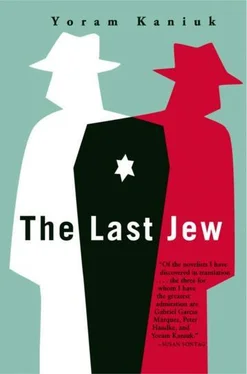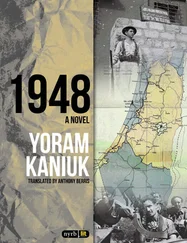And what do you do in civilian life?
Grave digger, prepare my financial future.
You're trying to be cynical.
Trying, that's right. Not living in the right man. A girl came to me, she's got long chestnut-colored hair and bright eyes. Not especially pretty, but belonging to somebody so temptingly. She said to me: I'm searching for a man. I asked if I could be the man. She looked at me contemptuously and I saw how she belonged to her somebody and I was jealous. And then she repeated: I'm searching for a man. I told her: What about his picture? She didn't have one. And she blushed because she didn't have a picture. She said: Listen, I'm searching for a man I love, and she didn't add anything more. Will you also ask somebody about my cock, will you say then: I'm searching for a man I love?
Yes, she said, and she smoked a cigarette silently and her breath was fast, almost loud. You understand, he said, the girl put a semicolon after the man, because maybe he's dead. She didn't know his last name. She met him in a tent like this in Bir-Gafgafa in the dark. When there were still a lot more planes ripping the sky. She didn't know the declension: "I loved," everything was fresh and still in the present tense. Like the grammatical judgment of a language teacher. I turn over for a moment, the blanket stabs what's-his-name. Like this. She can't draw me the face of the lover. He had no geographical bearings or characteristics, normal or otherwise. No special signs. Only certain things, she said, swallowed those words. And then she said again with surprising speed: Things that can't be defined, she meant what happened to them together in the tent. Maybe she loved him because he died? How do I know? And if he died, maybe she'd love him forever. Isn't that safer?
She crushes the cigarette. Rustling is heard outside. Three half-tracks rumble up and brake. Music from the radio mixed with a roaring motor. The flash of pale blue light in the tent flap. A wind strikes the tarp. She sinks her head deep into the small hard pillow. I recall going out with my lover, she said.
He laughed.
And he's alive, she said.
Ah, but for how long?
A long time. Once he took me to the movies. That was soon after we met. He'd sit in cafes, go to matinees, waste time, sit next to me in the movies and even though he looked like a letch, he was afraid to stroke my back. I thought: Why doesn't he understand I've got breasts? Why doesn't he put a hand on my breasts, he thought I was a dangerous girl.
In the morning she sits at the teleprinter. Third shift. All the time she receives messages. Words appear-missing, missing, fell, fell, wounded. Names, numbers, identity tags. She drinks hot coffee from a cardboard cup and writes the dead. Suddenly she shrieks: Joseph Gimmeleon. Just yesterday he came into the teleprinter room and saw three girls and didn't know which one of us to desire more. So perplexed and lost he stood there. And I was the oldest. The officer with the soft sweaty hands didn't let him take us to the movies. He said: I'm from Haifa, and Talya made him a red paper flower. He stuck it in his shirt lapel and disappeared with Zelda. She phones the battalion. A field phone hums. A commander yells at Talya, come down from the line, she comes to a third in command who sleeps with her every third night. From the distance, from the war, a voice rising and falling like a roar answers her: What, what, Joseph, Joseph Gimmeleon, the body wasn't intact, they found a red paper flower. I'm coming tomorrow, and he hung up.
Bring you coffee, he asked.
Bring yourself, fool, she said.
I'm wiped out from the teleprinter, she said, but without naming names, and clean up your smell, don't want to smell death.
He stood in the tent flap. Took off his clothes. She strained her eyes but didn't see a thing. He said: Wait a minute. And then a car passed by in the distance and sprayed a little light. He stood there shaking and naked and she laughed.
He went to her and she said: You look like a skeleton. Want to touch you. Then if you want, you can. On a night like this I'm easily raped. Mainly by a living person, without a red paper flower, but don't try to be close or understanding, you'll just touch me and I you. In bed he hugged her and the shaking passed. Try to be romantic, she said, but without love. He said to her: I'll put a paper flower in you. She said: You're faking, you behave as if you know this body, think it's an instrument, be more careful, more calculating, you're sweet. And he said: No compliments, listen to the distant cannons, killing.
Then she stands up and he hugs her. Don't be a dead picture for me, she says. We fit in terms of height. Maybe we'll love each other again, she says, and they sway in an uncompromising prayer and things are forgotten. He steps on chewing gum and is disgusted. He also tosses her onto the bed, clings to her, that need to be loved by a real enemy who is you, and she puts her life on his erection and lies there, waiting, sweat pouring, that beauty of a mad lusty movement in a tent, you and I, two strangers. Listen, you can do with me what you want, but only in the dark and as an undesirable woman, as I am, don't relent, here I'm touching, touching with my feet the ceiling of the tent. Lick like that toward Mecca, yes press like that. Press… You think there's a God? I don't care. There are officers outside with national erections. You think there really are national goals. Here we can beget a Hebrew soldier for the ninth war, in this state a national mutation will take place and they'll beget children with rifles attached. You exaggerate, she said unemotionally. Everybody has a different name for what's happening here. Tomorrow you take the picture of that cock and walk in the sands and search for me. Ask horny soldiers if they knew me. Tell them you didn't know my first name or my last name. In that silence to penetrate to the throat and cut it. Generally, she says, I love first and only then do they come into me. Now it's vice versa. Who needs victory? Don't stop. I'm unable to love, he says, and she says: From death you came and to death you'll go, I'm lost between here and there.
And beyond them, far from there, people are killed. Bullets go astray at night. Airplanes go on final sallies. The teleprinter doesn't speak his name.
Then she smokes a cigarette. Silence. Pleasant odor of burned red war kerosene. If that smell is pleasant, it means I'm alive and well. The wind isn't blowing anymore, eh?
The wind isn't blowing, he said.
Talya had a boyfriend, she said.
You make friends fast. I've been here three and a half weeks and I've got only you. You've already got girlfriends, officers with wet hands, memories.
You should know me in civilian life. I silence the radio. But that's not important. My friend, Talya, had a boyfriend. Before the adjutant who slept with her. And I've also got an affair with you, even though I love somebody else.
Talya's boyfriend lives in America and sends her letters. She says that's convenient for her. She wants to know if she really loves him or not and the distance is a test. He'd come for every war. On the first plane he'd come. His unit loved him because he'd bring them presents-real jeans, lighters, American cigarettes. He once brought a mixer for one of them, she says.
Who?
Talya.
Oh. Give me a drag. He drags on the cigarette and puts it back in her lips. He looks at the dark, at the slit of pleasure of the juncture of her lips. A junction of pleasure of strength and softness. And she goes on: After the wars and the campaigns, Talya says, he goes back to America. He'd also bring whiskey. And for that war he came late. They had a pool about when he'd come and if. He came on the third day. From the airport he came straight here. His friends took blankets, a kitbag, and personal weapons for him. Even a little book of Psalms and the prayer of the warrior. He came straight to the desert with a James Bond case and a suit and tie, put on a uniform, and in two hours he went out in their half-track. Then he came back to Talya and she was in the clinic. They met by chance. They slept together one night. She says it was great. He forgot his James Bond case at her place and came back. The case was empty, she says. Why did he bring an empty case? Two days later, she went to his parents in Jerusalem. The father saw her and hugged her. The mother gave her a cup of tea. Talya sat in her filthy uniform and drank. They hung pictures of him all over the house. His father said: See how lucky we are, this time he didn't come. And the mother was glad the son didn't come, this time she had fears and dreams, but he didn't come so everything was fine. In America they're not fighting in the Sinai now.
Читать дальше












